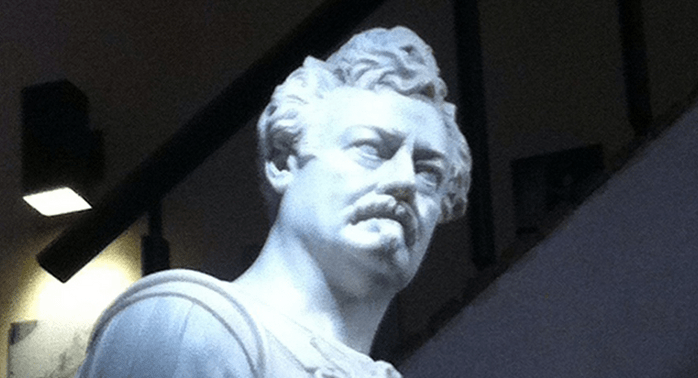
“How many of you have prayed, ‘God, help me to love you more?’” the pastor asked from the pulpit.
Me, I volunteered silently. For 20 years, I had prayed those words almost as ritualistically as the Lord’s Prayer. Those words were my desperate, white-knuckled grip on grace—because, like the Prodigal Son, I knew about loving something and someone other than God.
“If you’ve prayed, ‘God, help me to love you more,’” the pastor continued, “you’re praying the wrong thing. You should be praying, ‘God, help me to know you more.’”
“Don’t ask God to do what’s your job,” he warned. “You don’t ask your husband or your wife to help you love them, do you? No, that’s your responsibility. And neither should you ask God to help you love Him.”
I have been protesting that sermon for three years now.
A Theology of Loving More
It’s not that I don’t love theology. I do. I believe in the great good that good doctrine can do as it teaches us about God, about the world, about ourselves. Every day, in fact, I read the Bible to know more of God. Every week, I participate in a Biblically reflective, theologically substantive liturgy. At home, our young children know something of the Trinity, atonement, and total depravity—because theology is a frequent dinner guest.
But for all of this accumulated knowing about God, never do I entrust myself to the foolhardy certainty that “knowing things” is a talisman, warding off temptation and threat. My spiritual problems, in fact, seem less related to what I don’t know and more related to what I don’t love.
Among Christians, we often hear that God will give us “the desires of our hearts.” And it’s true that God cares about our innermost desires, but often, we need His intervention to shape those most important desires, including our desire for Him.
Every one of us needs to be praying, “God, help me to love you more.”
Confessions
Three years ago, I intuited this from my own spiritual history. Mine was a heart prone to wander, and the prayer the visiting pastor in our pulpit was warning me not to pray was precisely the prayer upon which I had learned to depend. Only more recently, however, have I been learning from Christian theologians why the formation of holy desire—holy loves—must be the focus of our discipleship. We can’t think our way into the Kingdom of God. We arrive there by love.
There’s probably no better ancient thinker on the subject of desire than Saint Augustine, fourth-century Bishop of Hippo, whose conversion in The Confessions he describes as “the struggle of myself against myself.” As a young man, Augustine understood that in order to follow Jesus, he would have to abandon his illicit passions. Like many of us, he struggled against the seemingly irresistible lure of extramarital sex and professional ambition. He despaired of himself, and though he wanted the surrender that obedient faith demanded, he failed to muster the courage repentance required.
“Grant me chastity and continence. But not yet,” Augustine prayed.
Competing desires warred within him until one day, beset by tears, he picked up the Scriptures and heard the unmistakeable voice of God. “Put on the Lord Jesus Christ and make no provision for the flesh, to satisfy their desires,” he read from the book of Romans. By the gracious intervention of the Holy Spirit, Augustine was, at that moment, made willing to love and obey Christ.
Holy Longing
Though Augustine knew firsthand the strangling power of sordid desire, he never suggested we abandon desire. Augustine knew that humans could not give up wanting, that central to human identity was our capacity for desire. Instead, he argued for its re-formation. “The whole of the good Christian is a holy longing,” Augustine wrote in one of his sermons. We are creatures made to love, so let us, then, learn to love what is most lovely—Christ.
James K.A. Smith is a modern theologian and philosopher whose book, Desiring the Kingdom, explodes the myth that discipleship depends on the transmission of information. We aren’t primarily thinking beings, Smith argues, we are worshipping beings: homo liturgicus. As such, every human being is in pursuit of the “kingdom.” The kingdom is the good life. It’s how we imagine our lives will flourish. “Rather than being pushed by beliefs,” writes Smith, “we are pulled by a telos [end or goal] that we desire.”
The Conversion of Our Desires
This means that we don’t intentionally think our way through the world: we feel our way through it, guided, in many respects, by the subterranean desires that form our habits. Beliefs don’t change behavior: desires do. Even the Scriptures warn of the demons’ accurate theology (cf. James 2:19). Until we recognize the need for something beyond cognitive conversion, Smith argues that the church is “pouring water on our head to put out a fire in our heart.”
Praying for the conversion of our desires—praying to love God— is exactly what we need for a lifetime’s supply of faithful following. Yet in truth, the practices that shape our desires aren’t unlike the practices the pastor, who commended we “know God,” would himself suggest. We’d both affirm church membership, Scripture reading, prayer and service among many other essential disciplines for spiritual transformation. In practice, we would seem like companions on the same journey.
But there would be an essential difference, and ironically, it would be a theological one. He would remain self-assured that a lifetime of Biblical study, devotional reading and theological education would amass necessary love for God. And I would walk more hesitantly, thinking of the Pharisees whom Jesus denounced, “This people honors me with their lips, but their heart is far from me,” (Matthew 15:8). Though I, too, would study and read and learn, in the studying and reading and learning, I’d recognize my own heart as a desperate sieve.
“God, help me to love you more.” A restless and reckless sinner, I would continue to pray this prayer. And find steadying grace.






















